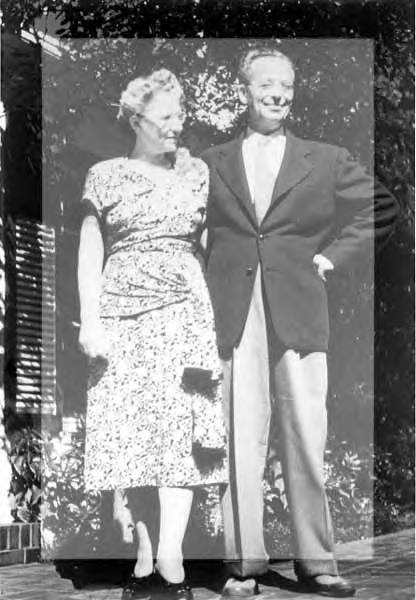Manya Lawson: early Kirkland businesswoman
One of the most-beloved and longest-lasting businesses described in the Lake Washington Belt Line in Kirkland feature is Quality Feed Mills (later Globe Feed Co.). Loita Hawkinson, President of the Kirkland Heritage Society, recently discovered an oral interview transcript with Manya Lawson, the matriarch of the family and the business, conducted on May 7, 1974 by Jeanette Schrieber, for the Jewish Archives Project of the Washington State Jewish Historical Society and University of Washington Special Collections. Loita wrote a great article from this transcript for the November-December 2020 issue of Blackberry Preserves.
I also read the transcript and put together the following information, which provides more information on the Lawson family and businesses as it relates to Quality & Globe. Enjoy!
Manya Rubin (b.1900) met John (Jack) Lawson (b.1893) in 1918 in Montreal and they married in 1919. Both families had emigrated from Russia to Montreal. Jack’s brother Sam lived in Seattle so Manya and Jack moved there in 1920 along with Manya’s parents. The family quickly realized that it appealed to them to live economically outside of the city and to build a challenging business. Manya’s father had been a wheat miller in Russia so when they learned that Quality Feed Mills was for sale in Kirkland, they took the plunge and bought out the business “with a little experience and a lot of hope”. At the time of purchase, Quality was a general store and a feed store that sold groceries, chicken feed, cow feed, horse feed, and so on to farmers.
The general store continued only a couple of years after the Lawsons bought the business because Quality began milling feed, manufactured under their own brand. Although Manya’s father did not have experience making animal feed, his general knowledge helped them get started in milling. Quality purchased Washington wheat and corn from Iowa or other Midwest states though Seattle-based grain brokers. Over time, the Lawsons bought and cleared three adjacent acres, which were served by the second spur.
Manya and Jack’s only child, Bernard (Bernie), was born in Kirkland in December, 1924. Manya worked “shoulder to shoulder” with her husband after they hired somebody to take care of the home. Manya was in the office most of the time and on the telephone. She started her day at 8am and sometimes made out statements ’til 2am, until they were able to hire somebody to help in the office. Jack was often on the road with farmers and devoted considerable time adopting and adapting feed formulas for dairy cows and chickens from Washington State University (Pullman College)’s extension office in Puyallup. For example, Jack read a lot of guidance and followed what was recommended for chickens to produce more eggs at the least cost. There had to be a certain amount of protein and a certain amount of fiber. Every feed they created was registered with the State. The Lawsons were very knowledgeable and intentionally passed on their learnings to farmers.
Quality had to compete with larger feed mills like Fisher and Albers. Manya related, “The only way we could compete with them with our label was to sell for less money but we also had to try and convince farmers that ours was as good. That took effort, knowledge, and ability; and Jack had it. He was on the road all day and became well-liked. You had not only to sell your product; you had to sell yourself. I had to know who was calling when I answered the phone.”
Although Manya and Jack had distinct primary roles in the business, Manya explained, “We exchanged opinions and formulated plans for how to go ahead or what to do or what not to do. We weren’t always right. We made our share of errors but it was so interesting, in spite of the burdens and the worries and aggravations that come along in every line of business. I still found it the most interesting and the most productive years of my life.”
At first, Quality sold feed in sacks. Later, the sack business declined and Quality delivered feed in bulk tank trucks, to a special shed each farmer built. Of course, this cost farmers less money because the sack cost was eliminated and they could store a month’s supply rather than just for a week. Besides Jack, Quality had two men on the road. One primarily checked on the growth and the progress of chicken flocks and the other checked on dairy cow production. These two men also collected accounts receivable. Some chickens were fed as egg layers while others were fed as broilers, and they required different feed formulas.
A farmer was primarily interested in the end result: How much money can he make? Of course, both the feed manufacturer and the farmer were at the mercy of markets. Quality couldn’t set its price on wheat or corn or soybean or linseed or anything. All prices were set by the market. If the market went up then Quality had to go up. If the market went down then Quality had to go down, reflected in the cost of production for the poultry farmer and the dairy farmer.
The Lawsons belonged to a feed dealer’s association, which held meetings every six months to a year. Members “tried to be pleasant competitors”. The strongest competitor, for everyone, was the Washington Poultry Association, aka the Washington Co-op, which manufactured feed, processed chickens, and marketed them. This was quite tough to compete against because a farmer who joined the Co-op was obligated to buy from them and sell to them.
Manya’s father died in 1940 at age 72. In 1943 the Lake Washington Shipyards began renting Quality’s warehouses for storing war material and the feed mill was shut down until 1945. Also in 1943, their son entered the Army and was stationed in Greenland until 1946. Near the end of the war, in 1945, the Lawsons bought out Globe Feed Mills in Seattle and began operating it. Soon after, the lease to the Navy was terminated so they moved back to Kirkland but kept the Globe name. Their son Bernie entered the business upon returning from Greenland. Jack died in 1948. Manya immediately sold their home in Juanita and relocated to Seattle but commuted to Kirkland until retiring in 1965.
Bernie closed the business in 1972 because of new pollution and ecology regulations regarding dust levels and rodent control. The government had given them a program to follow which was “materially and financially impossible” for them to implement, but unless they followed the recommendations, they couldn’t continue operating. In the beginning, the area around the business was not a residential district but it built up over the years, which was the primary reason the stricter regulations were imposed. Manya summarized, “We had some good years. We had made mistakes but all-in-all, we had a fine business and we had a very good reputation.” (At the time of the interview, Bernie was working for a former, un-named competitor, which other sources indicate was T-D Feeds in Redmond, owned by Bud Thompson and Lowell DeYoung.)
Manya related, “When I look back at Kirkland, I feel those were the happiest days of my life because I was producing. I was involved. I loved business. I loved the association with men in the business. I was never interested in organizations or playing cards. My husband and I were very self-sufficient. We lived in a beautiful home in Juanita, a ten acre farm, had a thousand chickens and a cow and a thousand trees, filbert and peach, and a quarter-acre of lawn. [After Jack died], I hated to part with it but it was much too large for me to live there alone.”
P. S.: We would love to get in touch with descendants and relatives of the Lawson family! Manya died in October, 1990. Bernard died in October, 1986 and was apparently living in Alexandria, Virginia at the time. Lillian, Bernard’s (ex?) wife, died in January, 2003 in Tacoma. Their daughter, Jacqueline, was born in May, 1951 and apparently died in January, 2001 in Ann Arbor, Michigan.

